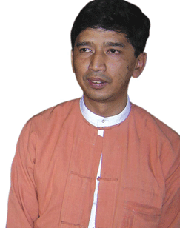One of Burma's most influential dissidents, Min Ko Naing, which translates as “The Conqueror of Kings,” was not among those released from jail in Wednesday's amnesty to over 6,000 prisoners. As one of the most influential leaders in the 88 Generation Students group, he played a key role in Burma's historic anti-government uprising in 1988 and was later jailed for 15 years until his release in 2004.
Min Ko Naing (real name Paw Oo Tun) was imprisoned again in 2006 for some months. After his release in early 2007, he and fellow 88 Generation Students group members initiated protests against a sudden hike in fuel prices, and all were arrested and sentenced to 65 years in jail.
To many people, Min Ko Naing's high-profile political activity puts him second only to detained Nobel Peace Prize laureate Aung San Suu Kyi as the most respected leader in Burma’s democracy movement.
The Irrawaddy spoke with Min Ko Naing in April 2007 before he was arrested and transported to a remote prison in Shan State. The following interview is a reprint.
 |
| Min Ko Naing |
Question:
The 88 Generation Students’ “Open Heart Campaign” has inspired ordinary Burmese to express their views about the country openly. What is the current status of the campaign and what has it accomplished? Answer: The aim of the campaign is to encourage the people to exercise freedom of expression, which is their basic right. We have seen the people become increasingly aware after launching the campaign. Some citizens wrote their opinions on paper and hung them on the fence of their homes. We have received a huge amount of letters from across the country and can draw the whole picture of the Burmese people’s desires. We have categorized the letters according to social, health and economic issues, and we are preparing a research report. After that, we will announce the result to the world.
Q: You and other leaders of your group were arrested last year on the charge that your efforts might lead to civil unrest. Do you feel that the current climate in Burma could become violent?
A: I think that depends on both the regime and the democratic forces. First, we all have to avoid acting out of emotion. When we publicly express our opinions and attitudes, we always take care to avoid violence. On the other side, there should be those who have the ability to listen to us. It is crucial [for the regime] not to approach everything with doubt. If they translate the situation simply into an attempt to overthrow their power, it will end up in a great tragedy. What’s more important is the people have to exercise that right to express their desires peacefully and with nonviolent means. On the other hand, the authorities should approach them in a positive manner and choose the best way to improve the situation. If they view our activities as a threat to their power and respond violently, our future does not look good.
Q: Do you think the road to national reconciliation remains open?
A: Actually, the doors are on both sides—one on our side and another on the government’s side. Our door remains open. While we are the oppressed who have been struggling against injustice in the country, we continue to open our door because we usually find the answer to a problem is based on the principle of national reconciliation. The issue is the status of the government’s door. We will continue to knock so that we can give them the message that we need to work together in making a nation instead of annihilating each other.
Q: The military government has taken a one-sided approach to national reconciliation—one that excludes [opposition leader] Aung San Suu Kyi and the National League for Democracy. Are you prepared to accept such an approach to reform?
A: We never focus simply on the view of an individual or a party. But we can’t accept a one-sided solution, which has forcibly distorted the results of the 1990 election. If we did, how could the people believe in any future election? An election can’t guarantee anything.

